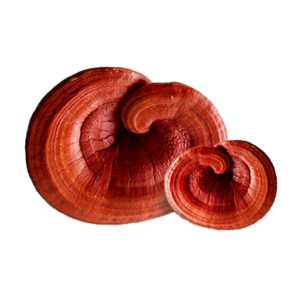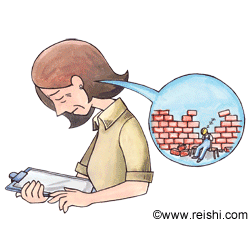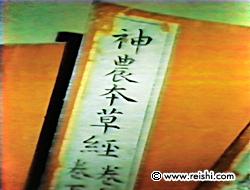Red
Reishi (Ganoderma Lucidum), commonly known as Ling
Zhi in Chinese, is a herbal mushroom known to have miraculous health
benefits.
So what's so good about red reishi?
- It is non-toxic and can be taken daily without producing any side effects.
- When it is taken regularly, it can restore the body to its natural state, enabling all organs to function normally.
- Immune modulator - regulates and fine tunes the immune system.
In addition to using red Reishi products, how can I improve my health?
Nutritionists recommend the following:

- Refrain from using refined sugar. Substitute with pure honey or fruit sugar instead.
- Avoid processed foods (e.g. canned foods, instant noodles, soda pop, etc.)
- Eat a healthy mix of natural foods from each food group to maintain your nutritional balance. Include all types of vegetables in your diet, especially those with stalks and roots.
- Drink more water. Try to drink 8 glasses of water a day. This will prevent cellular dehydration and enhance your metabolic functions to rid your body of poisonous waste.
What is Reishi?

Red
Reishi (Ganoderma Lucidum), commonly known as Ling
Zhi in Chinese, is a herbal mushroom known to have miraculous health
benefits.
So what's so good about red reishi?
- It is non-toxic and can be taken daily without producing any side effects.
- When it is taken regularly, it can restore the body to its natural state, enabling all organs to function normally.
- Immune modulator - regulates and fine tunes the immune system.
What are the benefits of Reishi?

Red Reishi improves
liver function
Red Reishi is primarily composed of complex carbohydrates
called water-soluble polysaccharides, triterpeniods, proteins and amino acids.
Researchers have identified that water-soluble polysaccharides are the
most active element found in Red Reishi that have anti-tumour, immune modulating
and blood pressure lowering effects.
Another major active ingredient found in Red Reishi are
triterpenes , called ganoderic acids. Preliminary studies
indicated that ganoderic acids help alleviate common allergies by inhibiting
histamine release, improve oxygen utilization and improve liver functions.
Triterpenes are bitter in taste and the level of the triterpene content
contained in a product can be determined by the bitterness.

Red Reishi enhance our body's
immune system
Regular consumption of red Reishi can enhance our body's
immune system and improve blood circulation, thus improving better health
conditions. Generally, Reishi is recommended as an adaptogen, immune modulator,
and a general tonic. Red Reishi is also used to help treat anxiety, high
blood pressure, hepatitis, bronchitis, insomnia, and asthma.
Is there any evidence?
A considerable number of studies in Japan , China , USA , and
the UK in the past 30 years have shown that the consumption of red Reishi has
been linked to the treatment of a vast range of diseases, common ailments, and
conditions. From asthma to zoster, the applications of red Reishi seem to be
related to a multitude of body organs and systems.
However, most of the scientific research that has been
conducted appears to strongly support red Reishi's role as a normalizing
substance - a nutritional supplement that can yield medical benefits through its
normalization and regulation of the body's organs and functions.
The role of Red Reishi in maintaining a healthy lifestyle can
best be explained through the Traditional Chinese Medicine (TCM) point of view
because none of the known active components taken alone is as more effective
than the consumption of Reishi itself. Whereas Western medicine focuses on the
“cure” after the disease has already occurred, TCM, established through over
2,000 years of human observation, focuses on disease prevention by sustaining
the right balance within the body through proper nutrition, exercise, and
meditation. Reishi is an important adaptogenic herb in TCM in helping the body
maintain this balance and also restore the balance when
Medicinal mushrooms: their therapeutic properties and current
medical usage with special emphasis on cancer treatments from Cancer
Research UK.
Table - Pharmacological effects of whole Reishi extracts in vivo and in vitro
- Analgesic
- Anti-allergic activity
- Bronchitis-preventative effect, inducing regeneration of bronchial epithelium
- Anti-inflammatory
- Antibacterial, against Staphylococci, Streptococci, and Bacillus pneumoniae (perhaps due to increased immune system activity)
- Antioxidant, by eliminating hydroxyl free radicals
- Antitumor activity
- Antiviral effect, by inducing interferon production
- Lowers blood pressure
- Enhances bone marrow nucleated cell proliferation
- Cardiotonic action, lowering serum cholesterol levels with no effect on triglycerides, enhancing myocardial metabolism of hypoxic animals, and improving coronary artery hemodynamics
- Central depressant and peripheral anticholinergic actions on the autonomic nervous sytem reduce the effects of caffeine and relax muscles
- Enhanced natural killer cell (NK) activity in vitro in mice
- Expectorant and antitussive properties demonstrated in mice studies
- General immunopotentiation
- Anti-HIV activity in vitro and in vivo
- Improved adrenocortical function
- Increased production of Interleukin-1 by murine peritoneal macrophages in vitro
- Increased production of Interleukin-2 by murine splenocytes in vitro
Key active constituents :
- Beta and hetero-Beta-glucans (antitumour, immunostimulating )
- Ling Zhi-8 protein (anti-allergenic, immuno-modulating)
- Ganodermic acids – triterpenes (anti-allergenic agents, cholesterol and blood pressure reducing

